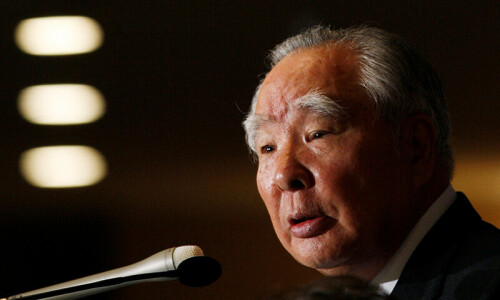“Please, could you ask Sahib to give me the next month’s salary in advance?” Fatima, a housemaid from rural Punjab who works in my father’s house back in Karachi, asked me. This conversation took place between us when I visited my father a few months ago. She then revealed that her husband had found a job in Dubai but the company who had hired him would not pay for the air ticket and she was trying to collect funds for it.
My father gave her the money she needed and Fatima seemed excited. “He will earn four times of what he earns now,” she told me happily. I re-visited Karachi a few weeks ago and I found Fatima a mere shadow of her former self. Her face looked pale and her eyes, bloodshot red, had deep hollows around them and her appetite had waned considerably. I found her crying uncontrollably one day and when I asked her what the matter was, I learned that Fatima and her husband had been legally wedded ten years ago by virtue of a ‘Nikkah’, but since her husband was completing his studies, and Fatima was only twelve years old at the time, both families decided to delay the rukhsati. Ten years later, Fatima is working as a housemaid, a period during which her husband not only completed his studies, but had also found a job in Karachi and then a better one in Dubai.
Now that he was comfortably settled in the UAE, her husband had broken off all forms of contact with her and her family. The man – it was ascertained through some of her kith in Dubai that he had fallen for someone else in the city – told Fatima in no uncertain terms, that it was best they filed for divorce, since he couldn’t travel to Karachi anytime soon. She was welcome to live with his parents (and, wait on them and cook for them) if she so wished (for a period of time between four to six years), otherwise, he would divorce her. For, after all, said he, the woman is like a shoe in the foot of the man, and it was up to him when to toss it out.
I couldn’t help but seethe at the injustice of it all. First, Fatima had been subject to a child marriage, and then her husband refused to live with her even after he had completed his studies and found a job in Karachi. Then suddenly, he waltzed off to greener pastures, leaving Fatima with two options: filing for divorce or staying with her in-laws.
The only viable option seemed the D-word, a route Fatima was really scared to choose, for, ‘What will people say?’. That presents another dilemma: divorcees (under all circumstances) are treated as though they are not normal and people whisper behind their backs and rumour-mongers happily lap up their story. While the man still stands a fair chance of finding a girl of his choice, the woman is thought to be incapable of re-marrying or finding a suitable partner.
Who is responsible for the morally and ethically unfair status of women in the rural areas of Pakistan? Why are the men answerable to no one? My heart goes out to Fatima who spent ten years of her life waiting for a husband who never showed up. A very large part of our society is mostly male-dominated and steeped in an unfortunate tradition of prejudice and injustice against women. Victims like Fatima do not have a voice and are considered secondary citizens. These women need to be empowered and educated (for themselves as well as for their male counterparts) in order to create an urgently-needed change. Until then, there will be many Fatima’s who will face similar and, at times even more traumatic, injustices.
As Charlotte Bronte rightly commented, “Prejudices, it is well known, are most difficult to eradicate from the heart whose soil has never been loosened or fertilised by education; they grow there, firm as weeds among rocks.”
Mehmudah Rehman is a freelance writer based in Dubai who blogs at Notes to Self.
The views expressed by this blogger and in the following reader comments do not necessarily represent the views and policies of the Dawn Media Group.












































